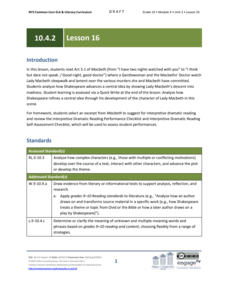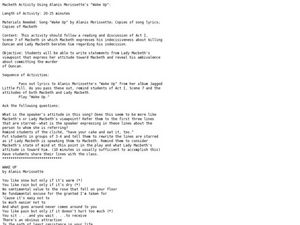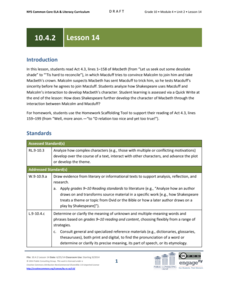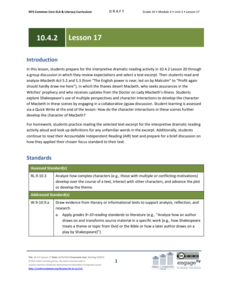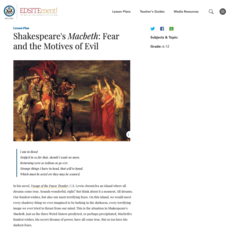EngageNY
Grade 10 ELA Module 4: Unit 2, Lesson 4
Ambition, murder, nontraditional gender roles ... some problems just can't be fixed in marriage counseling. Learners discuss the relationship between Macbeth and Lady Macbeth. As a culminating activity, pupils analyze how the characters'...
EngageNY
Grade 10 ELA Module 4: Unit 2, Lesson 16
How do complex characters develop throughout a text? Pupils read Act 5.1 from Shakespeare's Macbeth, which depicts Lady Macbeth's descent into madness. Using discussion and writing exercises, scholars analyze how Shakespeare develops...
EngageNY
Grade 10 ELA Module 4: Unit 2, Lesson 10
Is it better to be dead than to "dwell in doubtful joy," as Lady Macbeth suggests in Act 3.2 of Shakespeare's Macbeth? Using the resource, scholars work in small groups to discuss how Lady Macbeth and Macbeth begin to unravel following...
Curated OER
Analyzing Atmosphere: Macbeth Murder Scene and Dagger Speech
Shakespeare's Macbeth (Act II, Scenes I and II) lacks explicit details of the murder of King Duncan, yet the author creates an atmosphere that allows us to visualize the event. Readers interpret the "Dagger Speech" by writing stage...
Shakespeare Uncovered
“Speak, I Charge You”: Macbeth On Your Feet, Not In Your Seat
“Is this a dagger which I see before me . . .” As part of a study of Macbeth, class members engage in a series of activities that get them up and moving. Individuals practice, then deliver, a line from the Scottish play. The entire class...
Curated OER
MacBeth Activity Using Alanis Morissette's "Wake Up"
Students analyze Macbeth through the lens of a pop song. For this Macbeth lesson, students read Act I, Scene 7 of Macbeth and determine Lady Macbeth's viewpoint. Students read the lyrics to Alanis Morrissette's song 'Wake Up' and work in...
PBS
Supernatural Shakespeare and Macbeth
"A drum, a drum! Macbeth doth come." The withered and wild witches of Shakespeare’s Scottish play launch an examination of the fantastical elements in Act I, scene iii, paying particular attention to the action, imagery,...
Curated OER
When Shall We Three Meet Again?
Double, double toil and trouble; Fire burn, and caldron bubble. Macbeth’s witches provide young actors an opportunity to try their hand at small ensemble acting. Using Act I, scene I of Shakespeare’s play, groups of three take turns...
EngageNY
Grade 10 ELA Module 4: Unit 2, Lesson 15
What goes around, comes around. Using the resource, pupils read Act 4.3 of Macbeth, in which Macduff and Malcolm plan to attack Macbeth. Scholars then hold a discussion and complete writing activities to analyze Shakespeare's structural...
EngageNY
Grade 10 ELA Module 4: Unit 2, Lesson 14
How does Shakespeare further develop Macbeth's character using the interaction between Macduff and Malcolm? Pupils write responses to the question. They continue their analysis of Macbeth with a masterful reading and guided whole-class...
EngageNY
Grade 10 ELA Module 4: Unit 2, Lesson 7
One sentence, so much meaning. Scholars analyze a quote from Act 2.3 of Shakespeare's Macbeth and explore the plot in a jigsaw discussion.
Curated OER
Macbeth: Denouement/Falling Action
Readers of Shakespeare explore denouement in Macbeth and track the play's falling action in Act IV, Scene 1. They complete a worksheet/table noting the content and significance of each of the three apparitions granted Macbeth by the...
Curated OER
Exploring the Expository Scenes in Macbeth
Students examine the function of exposition in play structure. They will be able to develop multiple interpretations and visual and aural production choices for Shakespearean scenes and choose those that are most interesting.
Curated OER
Macbeth: Shakespeare for Elementary Students (Elementary, Literature)
Students act out a fully realized Shakespearean play designed to be utilized by mid level elementary students.
EngageNY
Grade 10 ELA Module 4: Unit 2, Lesson 12
How do the Three Witches' interactions with Macbeth advance the plot of Shakespeare's Macbeth? Learners complete a Quick Write to answer the question. They also participate in a whole-class dramatic reading of Act 4.1.
EngageNY
Grade 10 ELA Module 4: Unit 2, Lesson 17
Madness, violence, despair—the titular character of Shakespeare's Macbeth is spiraling out of control. Pupils first explore the topic with a collaborative jigsaw discussion. At the end of the instructional activity, they write about how...
EngageNY
Grade 10 ELA Module 4: Unit 2, Lesson 19
A tragic play includes imperfect heroes, pity and fear, and a fatal flaw. Scholars analyze Shakespeare's Macbeth as an example of the tragedy genre. Pupils demonstrate understanding by completing a Quick Write discussing how Shakespeare...
EngageNY
Grade 10 ELA Module 4: Unit 2, Lesson 9
How does Shakespeare develop the central idea of agency versus fate in Macbeth? Using the resource, pupils work in small groups to discuss the plot of Act 3.1. Next, they complete a brief writing assignment to analyze how the main idea...
EngageNY
Grade 10 ELA Module 4: Unit 2, Lesson 8
Shakespeare's Macbeth has something for everyone. Scholars complete a mid-unit assessment. They craft multi-paragraph essays to analyze how the author's structural choices create tension and suspense in the play's first two acts.
EngageNY
Grade 10 ELA Module 4: Unit 2, Lesson 13
Lady Macduff uses a metaphor to suggest that her husband does not possess the courage of even a tiny, short-winged bird—ouch! Using the resource, pupils discover Act 4.2 of Shakespeare's Macbeth. Using reading, writing, and discussion,...
Curated OER
Macbeth - Analyzing Characterization in Drama
The writing activity in this lesson could be used to assess student understanding of previously taught concepts of how language reveals character.
Curated OER
Macbeth Madness
Students analyze Shakespeare's Macbeth by completing the creative activities. In this Macbeth lesson, students discuss the timeline for William Shakespeare and identify the characters for Macbeth. Students read Act One, Scenes i-v of...
National Endowment for the Humanities
Shakespeare's Macbeth: Fear and the Motives of Evil
High schoolers use an online search engine (or a printed concordance) to locate passages that highlight Macbeth's response to fear and his descent into evil. They analyze the motives of Macbeth's increasingly desperate and evil actions.
Curated OER
Shakespeare's Macbeth: Fear and Motives of Evil
Learners complete play and vocabulary analysis for William Shakespeare's Macbeth. In this Macbeth analysis lesson, students use an online research engine to locate passages that highlight Macbeth's response to fear and his descent into...



